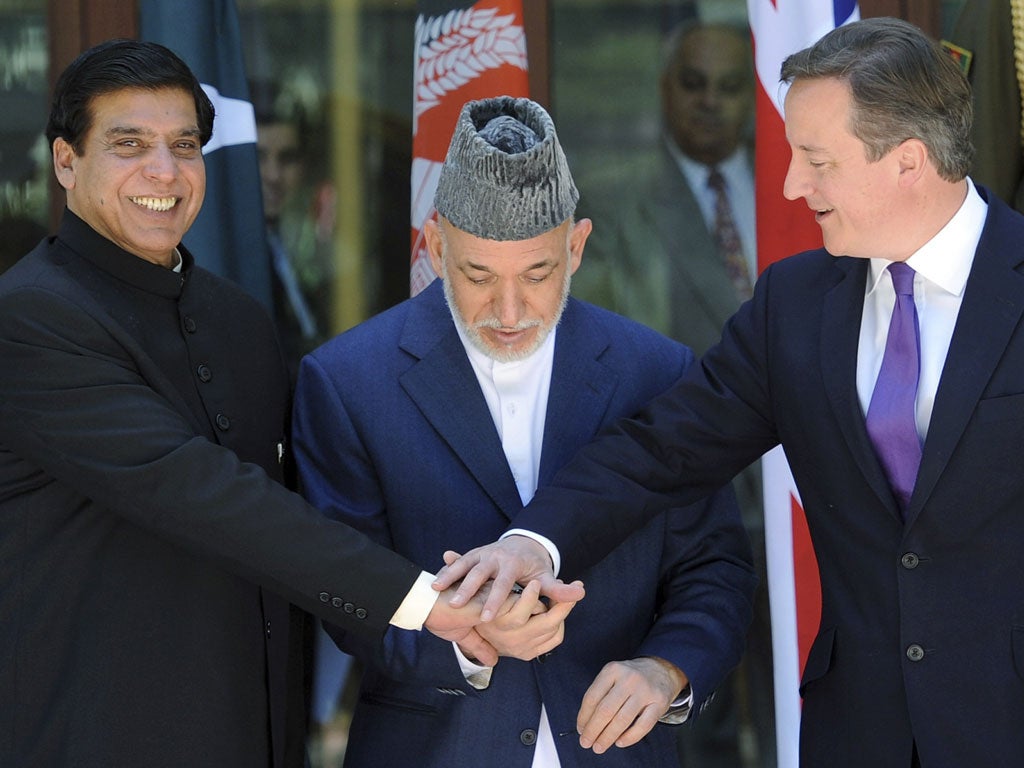Cameron admits Taliban just waiting for troops to leave
Fears grow that early exit in 2013 would leave Afghans at mercy of rebel attacks

Your support helps us to tell the story
From reproductive rights to climate change to Big Tech, The Independent is on the ground when the story is developing. Whether it's investigating the financials of Elon Musk's pro-Trump PAC or producing our latest documentary, 'The A Word', which shines a light on the American women fighting for reproductive rights, we know how important it is to parse out the facts from the messaging.
At such a critical moment in US history, we need reporters on the ground. Your donation allows us to keep sending journalists to speak to both sides of the story.
The Independent is trusted by Americans across the entire political spectrum. And unlike many other quality news outlets, we choose not to lock Americans out of our reporting and analysis with paywalls. We believe quality journalism should be available to everyone, paid for by those who can afford it.
Your support makes all the difference.David Cameron has warned the Taliban during a visit to Afghanistan that they will not be able to simply "wait it out" until troops withdraw in 2014.
The Prime Minister said British support for the country would remain long after the planned exit date. But his words are unlikely to deter the Quetta Shura, the insurgent leadership, and their handlers in the ISI, the Pakistani intelligence service
Mr Cameron stated: "What I would say to the Taliban is be in no doubt there is a very clear and strong plan to transfer lead security responsibility… to very capable Afghan forces."
What is at issue is when this transfer takes place. During his trip, Mr Cameron appeared to confirm a report that Oliver Letwin, the chairman of a new armed forces Cabinet sub-committee, had proposed that pulling out all combat troops by 2013, a year ahead of schedule, would save £3bn and that this has the support of George Osborne. The Prime Minister would only say that he would not disclose discussions within the National Security Council.
So worried have senior military officers become that the Government may not last the course that lobby correspondents travelling with the No 10 party were briefed about the risks of premature withdrawal. Areas in Helmand which were battlegrounds just a couple of years ago are now comparatively stable, it was pointed out, because of "boots on the ground"; leaving too early would mean jettisoning gains made with the sacrifice of UK lives.
The scaling down of forces has been calibrated in detail with the Americans and, crucially, with the realistic rate at which Afghan security forces can reach their target numbers with adequate preparation and support. Cutting corners in vetting and training of recruits would not only leave them vulnerable to the insurgents, but could lead to more "green on blue" attacks with Afghans turning their guns on their erstwhile allies.
In Kabul, Mr Cameron apparently questioned the Afghan President, Hamid Karzai, about the slow progress of peace negotiations. According to Downing Street briefings, Britain is "privately irritated" that one set of talks in Qatar between representatives of the insurgency and Western officials broke down because the Afghan government complained about being excluded.
In fact a whole series of talks – in Afghanistan, Pakistan, Dubai and even the Maldives – have broken down for a variety of reasons. Afghan and American and British officials claim that, on occasions, this has been due to deliberate sabotage by the ISI.
Critics could point out that it is an astonishingly colonial attitude that the Qatar talks about the future of Afghanistan were even contemplated without the Afghan government taking part.
The Afghans could also remind Mr Cameron that the UK's role in the peace process has not always been covered in glory. Two years ago British officials were duped by a conman claiming to be Mullah Akhtar Mohmmad Mansour, the supposed second in command of the Quetta Shura, who was given UK funding.
Join our commenting forum
Join thought-provoking conversations, follow other Independent readers and see their replies
Comments